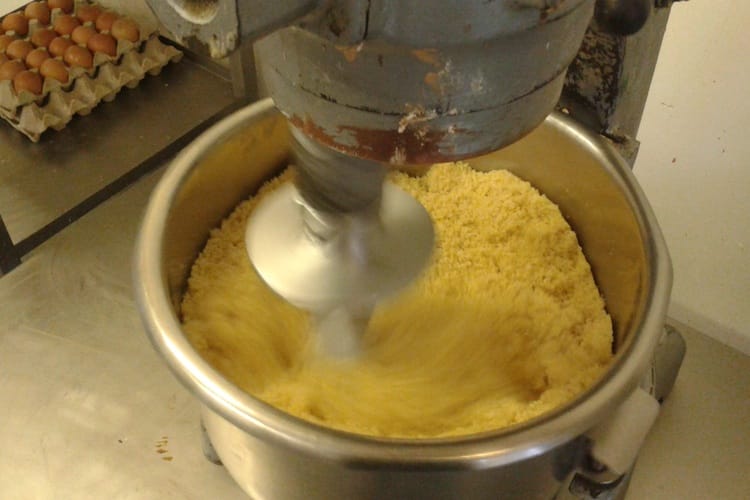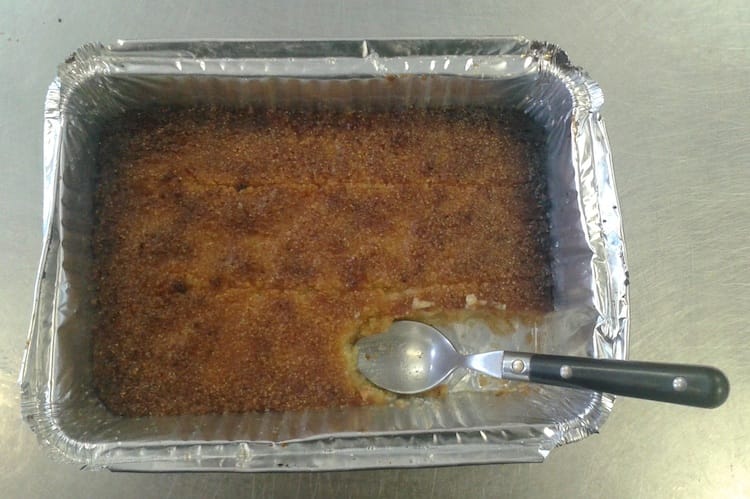What’s the best way to tell area residents about plans for a new asylum shelter nearby?
The government should tell communities directly about plans for new asylum shelters, some activists and politicians say.
Chef Farid Tadjine sells his sticky sweet kalb el louz each year during Ramadan at Camden Halal on Lower Camden Street. Get it while you can.

It’s an old trick. Put the lip-smacking sweet stuff near the counter. The big supermarkets do it. So, too, it turns out, do the growing offering of ethnic stores in Dublin. Fresh baklava. Hot samosas. Flaky flatbreads.
Or, if the shop happens to be Camden Halal on Lower Camden Street, kalb el louz prepared by chef Farid Tadjine.
He only makes the sticky semolina desert during Ramadan, he told me on Monday in his kitchen at the Spade Enterprise Centre in Smithfield, as he threw together a batch. It’s popular around now because it gives the kick of sugar that Muslims need to refuel after a day of fasting.
A giant walk-in refrigerator hums loudly in the corner. There’s a crate of meringues against the wall, and shelves with sponges and what look like bases for flans. There’s a bucket on the floor of pre-prepared syrup that has been heated and cooled – water, sugar, some glugs of orange-blossom water, and some floating pieces of lime. On the metal table is a tin-foil container with a slab of made-earlier kalb el louz.
Kalb el louz originates in Algeria, where Tadjine – a slight man in a striped navy apron – also lived until his cousin tempted him over to Ireland about nine years ago. His cousin had been at a summer wedding where Tadjine had made the cakes; when he found out Tadjine had baked them, he asked him to come to Ireland where he had a restaurant at the time. “I liked it, so I stayed here,” Tadjine said.
As deserts go, kalb el louz is “very simple,” he says. The base is sugar, semolina, and orange-blossom water. He also uses butter ghee. The difficulty is making sure you pour on the right amount of syrup towards the end, he says. “You have to measure with your eyes.”
First step is to mix the semolina and sugar and some water, he says, opening a big bag. He uses 1kg of semolina, and 700g of sugar. “You can try it,” he says. It tastes like crumble.

He pours it all into a big mixer, and uses a white cup to ladle in water as it churns into a spongy dough.
He’s been a chef for almost 25 years, he said. He started cooking in kitchens in Algiers after he finished school. He got sick the first week, from the smell of butter and flour. Then he went back and has been baking ever since.
He’s been running his cake business here, called Death By Chocolate, for a couple of years after he took over from his boss. He’s got regular customers – some restaurants, hotels – but it’s hard to pick up more, he said. He tried to bring in a sales person, but it didn’t pay off.
He sets out a grid of tin-foil boxes, and starts to dollop the mixture into each. “I have to measure it,” he says. “I put 400 grams.” If you put too much, once you add the syrup it gets messy.
Right now, he sells about 100 or 150 slabs of kalb le louz each week. Each year, after the end of Ramadan, he puts a couple aside and freezes them. A few months down the line, he’ll take them out and treat himself. It keeps for a while, a month in the fridge.

He taps down the sandy dough gently and splashes butter ghee on top. “Spread,” he says. “Don’t press hard.” He puts the trays to one side to rest.
I don’t see the end of the process. But they’ll be baked in a hot oven, and scored into pieces, and doused in the fragrant syrup. They taste stodgy and sweet like a gulab jamun. They’re best if they rest overnight, he says. And “have it with a cup of tea”.
You can get kalb el louz at the counter of Camden Halal on Lower Camden Street until the end of Ramadan, which is due at the end of next week.